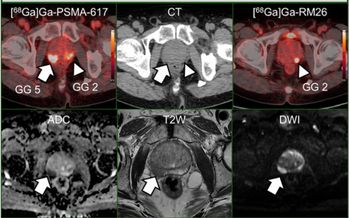GE HealthCare Debuts New PET/MRI System at SNMMI Conference
The newly launched Signa PET/MR Air device offers technological features that may bolster image quality and enhance diagnostic accuracy for diseases such as prostate cancer and Alzheimer’s disease.
Offering a variety of reported technological advances to facilitate the diagnosis of conditions such as Alzheimer’s disease and prostate cancer, the Signa PET/MR Air system (GE HealthCare) will be launched at the Society of Nuclear Medicine and Molecular Imaging (SNMMI) conference in Chicago.
The
Other features of the Signa PET/MR Air system include the Time-of-Flight (TOF) PET detector and MotionFree Brain PET. Addressing patient motion during exams without external tracking devices, MotionFree Brain PET enables consistent image quality, which reduces repeat scans and may potentially improve diagnostic accuracy for challenging patients, according to the company. GE HealthCare added that the sensitivity of the ToF PET detector can detect adverse effects in a single scan and provide insights into disease progression.
“Our latest PET/MR technology will directly impact the most challenging diseases, such as prostate cancer and Alzheimer’s disease. These diseases require precise and comprehensive imaging for accurate diagnosis, treatment planning, and therapy monitoring,” noted Jie Xue, president and CEO of MR at GE HealthCare. “We are excited to see SIGNA PET/MR AIR addressing these challenges and fulfilling our vision of providing access to advanced, personalized care.”
Newsletter
Stay at the forefront of radiology with the Diagnostic Imaging newsletter, delivering the latest news, clinical insights, and imaging advancements for today’s radiologists.














